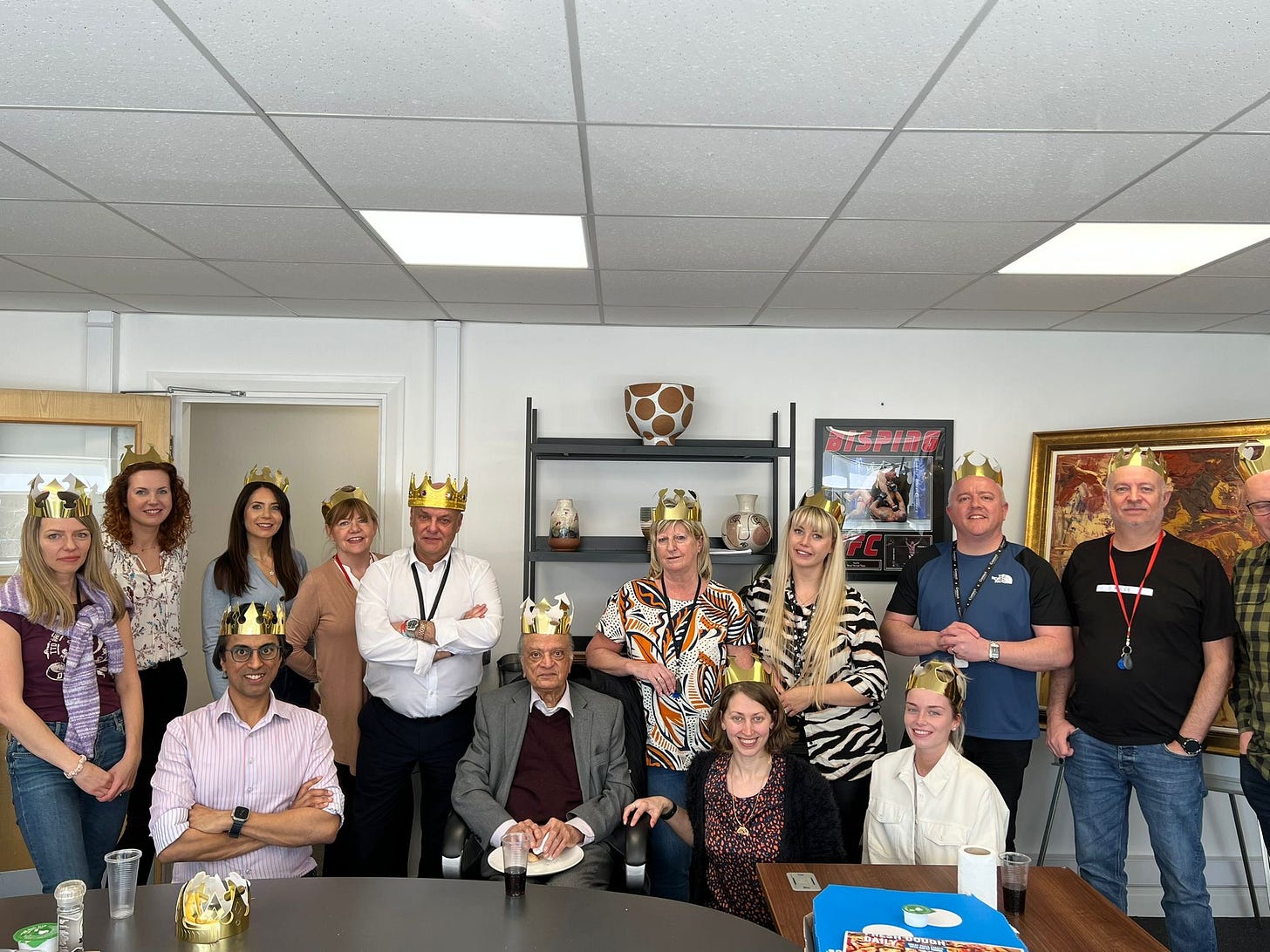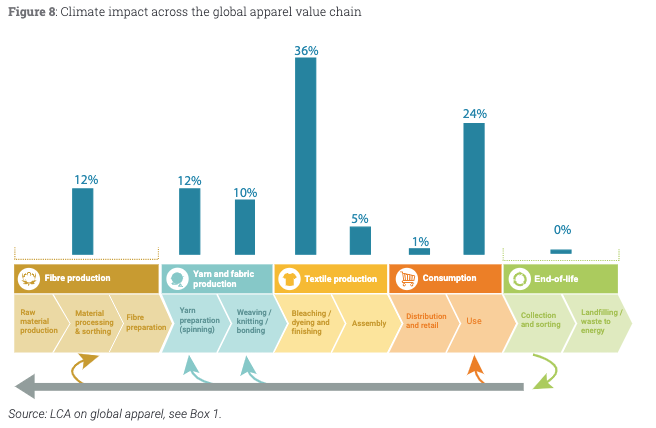March marks my 1-year work anniversary at Swiscot. It might have been a bit of a leap to join the business with Vikas, but it was the right move. The last 12 months have been a time of huge personal and professional growth. Learning all about a new industry. Adapting back to SME life. Navigating how to help the business become more sustainable. Not a small undertaking. But if you know me, I like a challenge! It’s been full of ups and downs, but I am proud of what I’ve accomplished in my first year.
Since April last year I have done a monthly blog post. It has been a way to share my learnings across Digital & sustainability. As well as a personal account of my journey. So, it seemed right to me to reflect on this milestone. So here are my 12 top learnings, insights and tips from 12 months at Swiscot.
Importance of reducing textiles waste
I was aware of the impact of fashion and garment waste. But had never really thought about home and commercial textile waste.
I’d never really thought about home or commercial textile waste. The largest part of our business is the supply of linen to laundries, therefore there’s a huge volume of material. You might have heard about the term extended producer responsibility (EPR)
Understand the climate impact across the end-end value chain. Below is an example of the life cycle analysis (LCA) across the apparel value chain. Which helps to see where further reductions can be made in terms of processing.
Micro-plastics - every time we wash bedding ( either domestically or commercially) there are micro-fibres that release into the water. There’s a lot more research and innovation needed to reduce the impact of micro-fibre on our water quality.
Commercial textiles waste I’ve been hugely encouraged to see schemes such as the TSA infinite textiles which aims to aggregate volume of end of life linen. Recycling the fibres to be spun into new yarn.
Domestic textiles waste - there’s also a huge volume of home textiles that go to landfill. Dunhelm now have a take back scheme where you can drop items in store to help reduce waste going to landfill.
Size & impact of laundry industry
Before I joined Swiscot I knew that the bulk of the business serviced the laundry sector. I understood that we sold bed, bath, kitchen, and table linen to laundries. Since then I’ve learned a lot more about the import role laundry plays.
Without professional laundry services 90% of hospitals would close after 1 day!
Textiles services industry contributes a total of £1.3billion in GVA to the UK economy and £190million to the Exchequer, while supporting 28,000 FTE jobs (TSA report)
The laundry industry is also one of the top 5 highest energy intensive manufacturing industries in the UK as well. Up there with bakeries and breweries.
Make space for quality down-time.
A personal learning around being a couple working together. While we see more of each other day-day at the office this is not quality time. There is the risk of the proximity bias. You think because you are around each other you’re engaging with your partner.
If anything, it’s more important to carve out time that has nothing to do with work. For example, going away on a work trip to an award does not constitute quality time together. We were organised with schedules before but now we make a conscious effort to book in R&V time.
All offices need a shower
A small but important point. With more people wanting to cycle to work all offices need a shower. Within my first month of joining, I asked Vikas to install a shower. This has made it far more practical to cycle to work. Workplace wellbeing being is a hot topic. Showers provide staff with the option of choosing to exercise around start/end times.
Employee engagement
Whatever the size of team in your company there’s value in how you bring people together. When I was delivery manager, I loved coming up with activities to support team building. I’ve enjoyed the small but impactful activities that created team togetherness. As well as linking to broader issues around health, wellbeing, and sustainability.
Step-tember – a team challenge to see which group could get the most steps in!
Plastic free July challenge – team competition for the most plastic free swops
Shine walk
Bring your dog to work day
Toastie Tuesday – a themed lunch day
Christmas shoebox appeal
Accept the help & leverage your networks
When I first joined, I felt quite overwhelmed with how much I needed to understand. It’s an obvious one but always seek out peer support. As well as considering what help you can get from business networks or industry associations. I’d got some contacts in sustainability so reached out to get their thoughts on best approach to take. Attending industry events and sessions built my confidence and understanding of textiles. A huge thank you:
Better Business Network
Elevate
Growth Company / Green Economy team
Pro Manchester
Textiles Services Association (TSA)
University of Salford
Clear lines on business development
Within 6 months of joining, I realised my eagerness to add value had slightly backfired. As Vikas’s wife I felt I had more to prove. To prove that I could add value the business and help win sales.
I enjoy meeting new people and connecting the dots around new opportunities. I had identified a potential customer via a marketing partnership. Inadvertently I’d spent too much time warming this contact up to the idea of working with us. Rather than introducing them to the sales team earlier on.
On reflection I realise I’d held onto the contact because I wanted to show I could add value. It’s important to recognise when you need to step away. Delegate and hand on the baton to other members of the team to do what they do best.
Remember to look back at how far you’ve come
I have a lot of energy and ambition. This helps me drive action. But it can also mean I’m dismissive of the progress I’ve made. As in my mind there’s still so much more to achieve. Writing regular month notes have helped keep an account of the progress I’ve made. I also do a regular practice of jotting down my achievements.
A new member of the team commented that I didn’t sound like I’d only been in the textile industry for 1 year. This was a timely reminder that sometimes you need to stop and recognise how far you’ve come in a year. And not just as part of annual reviews and NY goal setting.
Sustainable skills gap – climate literacy
The Green economy is one of the fastest growing job markets right now. Yet there’s not enough conversation about how businesses can harness existing talent to support the transition to net zero. As well as a gap in carbon literacy. A book I read which made a huge impact on me is How bad are bananas.
I’m all for consumers applying pressure on businesses. Very few business conference attendees report knowing their personal carbon footprint. We can’t ask business to do all the heavy lifting. As individuals we also need to understand the impact of our choices. As we can choose to change spending habits. For example flying less!
Initiatives like carbon literacy training help. We’ve been fortunate to have 2 members of the management team attend the training. I’m considering becoming a trainer. I can help SMEs and individuals understand carbon and consider their carbon footprint.

Running an SME business is tough.
We often forget the significant role SME businesses play within the UK Economy. 64% of people in the UK work in SME businesses. And SME’s account for 99% of all private businesses in the UK.
I was already so proud of what Vikas has achieved with Swiscot. 20 years on from buying his Dad out he’s grown the business to be a leading UK linen supplier. As well as running a business with ethics at the heart of how we operate. And fundamentally treating people well. It says something when members of the team have been with the business for 20 years!
Having a seat on the inside of the business I’ve now seen first-hand how much he’s put in. As well as the mental resilience its needed to keep on going. Especially given that the business had to overcome Brexit and the pandemic. Working in larger corporates you forget sometimes how hand-mouth it can be for small business owners.
This is to say I’ve got a whole lot more empathy for all the business owners out there.

Regenerative agriculture
My grandad was a dairy farmer. So, I have an affinity with small holder farmers and the economics supporting the livelihoods of farmers. We forget that cotton is a natural fibre which grows in fields. There is a huge focus on reducing the climate impact of growing crops in the food industry. It’s important to remember that natural products aren’t bad for the planet! It’s the intensity with which we’ve been producing goods. Cotton is a bio-degradable fibre as its natural! Cotton has had a bad wrap over recent years with the amount of water it takes to make a t-shirt or pair of jeans.
I’ve been impressed to learn about schemes like Better Cotton Initiative (BCI). BCI supports sustainable cotton growing at farm level. Enabling cotton growers to get a fair price. As well as investing in sustainable farming methods that reduce pesticides & reducing emissions from cotton growing. Better cotton is better for people and planet.
Time management
As a team of 1 I’ve had to be diligent with my time management. Especially covering 2 areas of activity. Colour coding has made a real difference to how I plan my time. I don’t miss my diary being full of virtual meetings. Though at quieter times of the year I have had that unusual feeling of a day with not meetings! I now block out my calendar to reflect the work and priorities I have. I also use colour coding to try and chunk up activities into half day buckets to help with focus. Though I’ll be honest I’ve got a lot more mail to deal with! That’s the one bit I do miss about being in a larger corporate is team collaboration via slack/teams.
There’s still lots to do. So many ideas and plans I have to make an impact. I’m incredibly grateful to have had this opportunity. SME businesses have the potential to respond and adapt to







